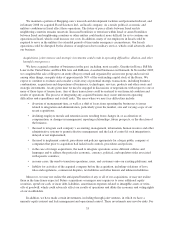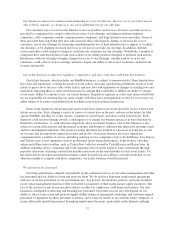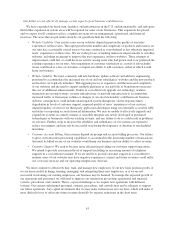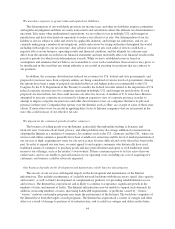eBay 2009 Annual Report Download - page 44
Download and view the complete annual report
Please find page 44 of the 2009 eBay annual report below. You can navigate through the pages in the report by either clicking on the pages listed below, or by using the keyword search tool below to find specific information within the annual report.We do not collect taxes on the goods or services sold by users of our services. One or more states or the
federal government or foreign countries may seek to impose a tax collection, reporting or record-keeping
obligation on companies that engage in or facilitate ecommerce. Such an obligation could be imposed by
legislation intended to improve tax compliance (and legislation to such effect has been discussed in the
U.S. Congress, several states, and a number of foreign jurisdictions) or if an eBay company was ever deemed to
be the legal agent of the users of our services by a jurisdiction in which eBay operates. In July 2008, the Housing
and Economic Recovery Act of 2008 (H.R. 3221) was signed into law. This law contains provisions that require
companies that provide payments over electronic means to users to report to the Internal Revenue Service (IRS)
information on payments received by certain customers. The legislation, effective for payments received after
December 31, 2010, will require PayPal and other electronic payments providers, as well as potentially StubHub
and similar companies, to report to the IRS on U.S.-based customers who receive more than $20,000 in payments
and more than 200 payments in a year, and to request tax ID numbers from U.S. users and track payments by tax
ID number. This requirement may decrease seller activity and harm our business. One or more other jurisdictions
may also seek to impose tax-collection or reporting obligations based on the location of the product or service
being sold or provided in an ecommerce transaction, regardless of where the respective users are located.
Imposition of a discriminatory record keeping or tax collecting requirement could decrease seller activity on our
sites and would harm our business. Foreign authorities may also require eBay to help ensure compliance by our
users with local laws regulating professional sellers, including tax requirements. In addition, we have
periodically received requests from tax authorities in many jurisdictions for information regarding the
transactions of large classes of sellers on our sites, and in some cases we have been legally obligated to provide
this data. The imposition of any requirements on us to disclose transaction records for all or a class of sellers to
tax or other regulatory authorities or to file tax forms on behalf of any sellers, especially requirements that are
imposed on us but not on alternative means of ecommerce, and any use of those records to investigate, collect
taxes from, or prosecute sellers, could decrease seller activity on our sites and harm our business.
We pay input VAT on applicable taxable purchases within the various countries in which we operate. In
most cases, we are entitled to reclaim this input VAT from the various countries. However, because of our unique
business model, the application of the laws and rules that allow such reclamation is sometimes uncertain. A
successful assertion by one or more countries that we are not entitled to reclaim VAT could harm our business.
We continue to work with the relevant tax authorities and legislators to clarify eBay’s obligations under new
and emerging laws and regulations. Passage of new legislation and the imposition of additional tax or tax-related
reporting requirements could harm our users and our business. There have been, and will continue to be,
substantial ongoing costs associated with complying with the various indirect tax requirements in the numerous
markets in which eBay conducts or will conduct business.
Our decision to launch our PayPal Developer Platform, which is open to third-party developers, subjects us to
new risks.
In 2009, we launched the PayPal Developer Platform to enable third party developers to access a wide
variety of PayPal product and programming code specifications and to connect to select PayPal payment
application programming interfaces (APIs). We also began providing a software tool kit for building mobile
payments applications. In addition, we provide third party developers with access to certain APIs with respect to
our Marketplaces platforms. There is no assurance that third-party developers will develop and maintain
applications and services on PayPal’s platforms on a timely basis or at all, and a number of factors could cause
such third-party developers to curtail or stop development for our platforms. For instance, if we develop our own
software applications and services, such development may negatively affect the decisions of third-party
developers to develop, maintain, and upgrade similar or competitive applications on our platforms. The
availability and development of these applications also depend on developers’ perceptions and analysis of the
relative benefits of developing software for our products versus our competitors’ products, including devices that
use competing platforms. If developers focus their efforts on these competing platforms, the availability and
quality of applications for our products may suffer. In addition, we may potentially become subject to additional
regulatory scrutiny based on applications developed by third-party developers.
36
























